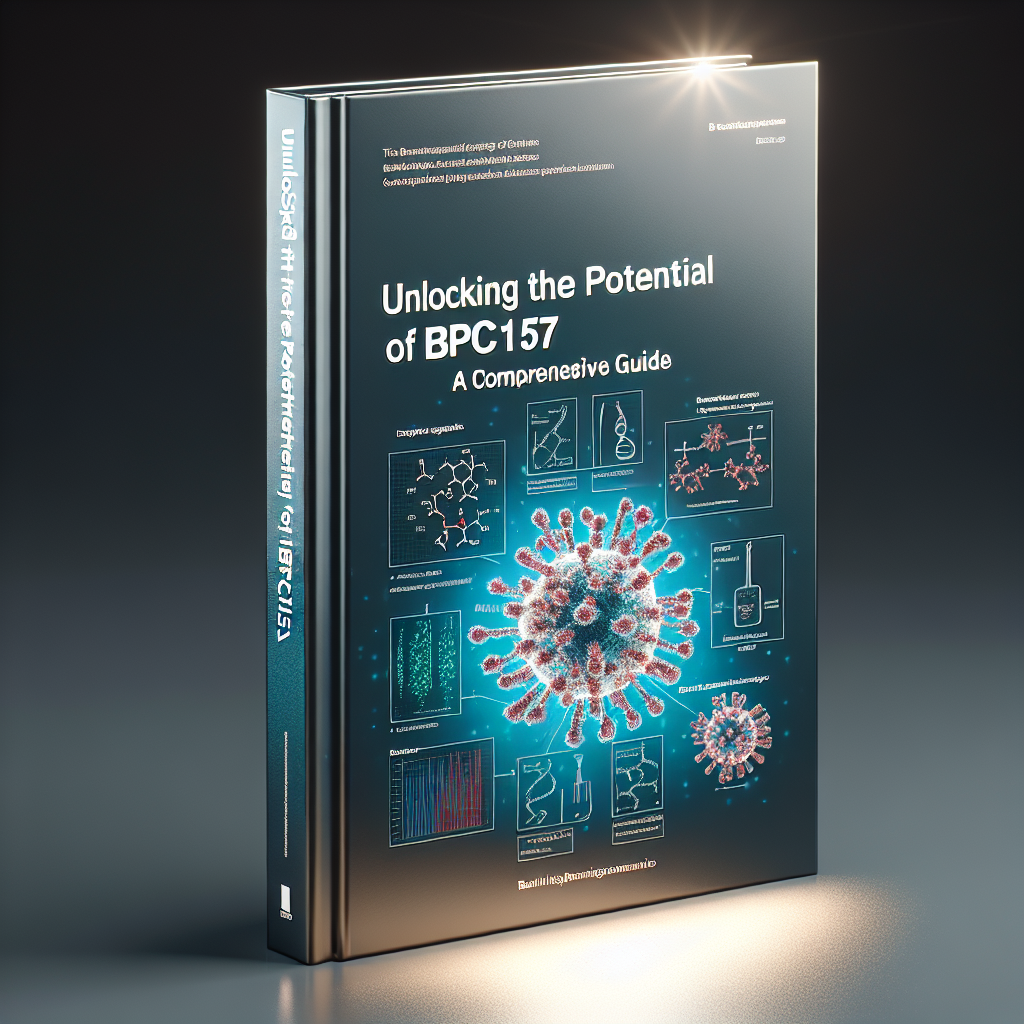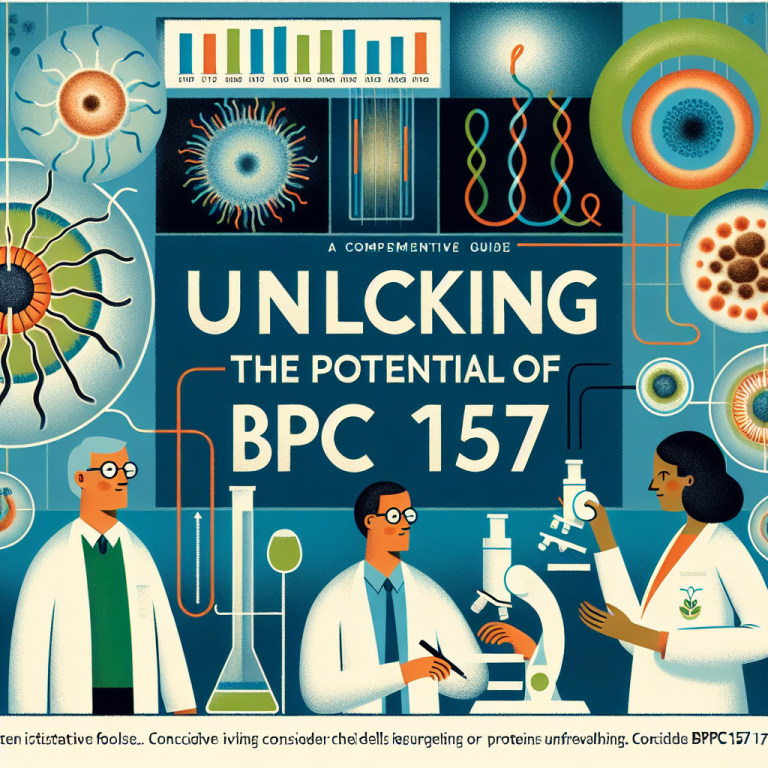Benefits Of BPC157 In Accelerating Injury Recovery
BPC-157, a peptide composed of 15 amino acids, has been gaining attention in the scientific community for its remarkable potential in accelerating injury recovery. This synthetic peptide, derived from a protein found in stomach acid, is primarily recognized for its healing properties, particularly in the musculoskeletal system. It has shown promising results in various studies, suggesting multiple benefits that could revolutionize treatment protocols for injuries and other physical ailments.
One of the primary advantages of BPC-157 is its ability to enhance the healing process of tendons and ligaments. These structures are particularly susceptible to injuries that are often slow to heal due to their limited blood supply. Research indicates that BPC-157 promotes tendon and ligament healing by triggering the formation of new blood vessels, a process known as angiogenesis. This not only accelerates healing but also reduces recovery time, which is crucial for athletes and individuals engaged in physical activities.
Furthermore, BPC-157 exhibits significant efficacy in the repair of muscles. Muscle injuries, ranging from strains to tears, are common and can be debilitating. Studies have demonstrated that BPC-157 facilitates muscle repair by up-regulating the expression of growth factors that are critical for tissue repair and regeneration. By doing so, it not only speeds up the recovery process but also enhances the overall quality of the repaired tissue, potentially reducing the risk of future injuries.
Another notable benefit of BPC-157 is its anti-inflammatory properties. Inflammation is a natural response to injury, but excessive inflammation can lead to prolonged pain and delayed healing. BPC-157 helps modulate the inflammatory response, ensuring that it remains within optimal levels to support healing without causing additional damage. This modulation is particularly beneficial in managing joint injuries, where inflammation can be a significant impediment to recovery.
In addition to its local effects on injured tissues, BPC-157 also has systemic effects that contribute to its therapeutic potential. It has been observed to improve digestive health, which is crucial for overall well-being and the efficient functioning of the body’s repair mechanisms. By enhancing gut health and stability, BPC-157 indirectly supports the body’s ability to recover from injuries and maintain a state of balance.
Despite its promising benefits, it is important to note that most of the research on BPC-157 has been conducted in animal models. While these studies provide valuable insights into the peptide’s therapeutic potential, clinical trials are necessary to fully understand its efficacy and safety in humans. As research progresses, it is hoped that BPC-157 will become a key component in the treatment of various injuries, offering a faster and more effective recovery process compared to conventional treatments.
In conclusion, BPC-157 presents a compelling case as a therapeutic agent for accelerating injury recovery. Its ability to promote healing in tendons, ligaments, and muscles, coupled with its anti-inflammatory and systemic health benefits, positions it as a potentially invaluable tool in medical and sports settings. Continued research and clinical evaluation will be critical in unlocking the full potential of this peptide, paving the way for its integration into therapeutic protocols that seek to optimize recovery and enhance the quality of life for individuals dealing with injuries.
Exploring The Potential Of BPC157 In Digestive Health

BPC157, a peptide composed of 15 amino acids, has been garnering significant attention in the scientific community for its potential therapeutic benefits, particularly in the realm of digestive health. This peptide, derived from a protein found in gastric juice, exhibits promising healing and regenerative properties that could revolutionize the treatment of various gastrointestinal disorders.
The exploration into BPC157’s effects on digestive health initially stemmed from its inherent origins in the stomach, suggesting a natural role in gastrointestinal processes. Research indicates that BPC157 promotes the healing of intestinal anastomosis, fistulas, and inflammatory disorders such as ulcerative colitis and Crohn’s disease. The peptide achieves this through several mechanisms, primarily by enhancing the angiogenic repair process. Angiogenesis, the formation of new blood vessels, is crucial for delivering nutrients and oxygen to damaged tissues, thus facilitating healing.
Moreover, BPC157 has shown capabilities in protecting the gut from ulceration and healing pre-existing ulcers. In experiments involving various animal models, BPC157 effectively reduced the spread of damage and accelerated recovery of the mucosal lining. This is particularly significant given the limited treatment options currently available for ulcerative conditions, which primarily rely on managing symptoms rather than promoting repair of the underlying damage.
Transitioning from ulcer treatment to broader gastrointestinal protection, BPC157 exhibits an ability to counteract the effects of gastrointestinal lesions caused by the use of NSAIDs (Nonsteroidal Anti-Inflammatory Drugs). NSAIDs are commonly prescribed for a range of conditions but can lead to severe gastrointestinal side effects, including ulcers and bleeding. By encouraging cellular repair mechanisms and modulating the inflammatory response, BPC157 helps mitigate these adverse effects, presenting a dual role in both therapeutic and preventative contexts.
Another promising area of BPC157’s application includes its impact on gut-brain communication. Recent studies have explored the gut-brain axis, a complex signaling pathway linking the emotional and cognitive centers of the brain with peripheral intestinal functions. BPC157 may influence this axis, potentially offering new ways to treat psychiatric and gastrointestinal disorders that are influenced by stress-related pathways.
Despite these encouraging findings, the journey from research to clinical application involves rigorous testing and validation. Most of the current understanding of BPC157’s effects comes from preclinical trials involving animal models. To establish a clear and reliable therapeutic protocol, extensive clinical trials involving human subjects are necessary. These studies will need to confirm the efficacy and safety of BPC157 in treating specific gastrointestinal conditions, determine optimal dosing regimens, and identify any potential side effects.
In conclusion, BPC157 holds a promising place in the future of gastrointestinal treatment. Its multifaceted role in enhancing healing, protecting tissues, and potentially moderating stress responses within the gut-brain axis opens new avenues for addressing complex digestive disorders. As research progresses, this peptide may well become a cornerstone in the therapeutic landscape of digestive health, offering hope for patients whose options were previously limited by the capabilities of conventional treatments.
The Role Of BPC157 In Enhancing Sports Performance And Muscle Healing
BPC157, a peptide composed of 15 amino acids, has garnered significant attention in the sports and medical communities due to its remarkable therapeutic properties. Originally isolated from human gastric juice, BPC157 is often referred to as a “body protection compound,” reflecting its ability to accelerate the healing of a myriad of injuries and conditions. Its implications for enhancing sports performance and muscle healing are particularly promising, making it a subject of interest for athletes, coaches, and sports medicine professionals.
One of the most compelling attributes of BPC157 is its ability to promote and expedite the repair of tissues, including muscles, tendons, and ligaments. This peptide has been shown to enhance the angiogenic repair process, essentially increasing the growth of new blood vessels in damaged tissues. This process is crucial for delivering vital nutrients and oxygen needed for repair, particularly in the physically demanding context of athletic performance where rapid recovery is beneficial.
Furthermore, BPC157 has demonstrated significant efficacy in reducing inflammation, a common response to muscle and joint injuries. By mitigating inflammatory processes, BPC157 not only aids in decreasing pain and discomfort but also accelerates healing, allowing athletes to return to training and competition more quickly. This is particularly advantageous in sports where repetitive stress and injuries are prevalent, such as in weightlifting or running.
The peptide’s benefits extend to its ability to improve the healing of tendon-to-bone injuries, which are notoriously slow to heal and often problematic for athletes. Research indicates that BPC157 enhances the expression of growth factors such as VEGF, which play a pivotal role in tissue healing. By promoting these factors, BPC157 facilitates the recovery process, potentially decreasing the likelihood of re-injury and enhancing overall joint stability.
Moreover, BPC157’s role in gastrointestinal health should not be overlooked, as it originally was derived to aid in treating gastrointestinal conditions. The health of the gastrointestinal system is vital for athletes, as it affects nutrient absorption and overall health. By maintaining a healthy gut, athletes can ensure that they are efficiently absorbing nutrients necessary for energy, performance, and recovery.
Despite these promising benefits, it is essential to consider the regulatory and ethical implications of BPC157 use in sports. Currently, BPC157 is not approved by the Food and Drug Administration (FDA) for human use, and its status in sports governed by anti-doping agencies is a gray area. Athletes interested in using this peptide should proceed with caution and consult relevant guidelines to avoid potential sanctions or health risks.
In conclusion, BPC157 presents a potentially revolutionary approach to sports performance enhancement and muscle healing. Its ability to quickly repair tissues, reduce inflammation, and promote overall joint health could significantly benefit athletes looking to optimize recovery and performance. However, the need for further research and clarity regarding its legal status in sports remains. As science continues to unravel the full spectrum of BPC157’s capabilities, it holds the promise of becoming a staple in sports medicine for fostering athlete health and performance.

